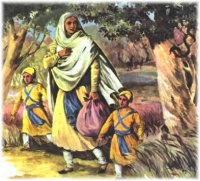Template:AOW56: Difference between revisions
Hari singh (talk | contribs) No edit summary |
Hari singh (talk | contribs) No edit summary |
||
| (8 intermediate revisions by the same user not shown) | |||
| Line 1: | Line 1: | ||
{{ | {{aowh2|Sahibzada Zorawar Singh|Sahibzada Zorawar Singh|birthday November 28}} | ||
[[Image:Sahib2.jpg|thumb|200px|right|<small>[[Mata Gujari]] with the [[younger Sahibzade]]</small>]] | |||
[[ | On '''[[28 November]]''' every year, the [[Sikh]]s celebrate the birthday of the third son of [[Guru Gobind Singh]], [[Sahibzada Zorawar Singh]] ([[28 November]] [[1696]] - [[26 December]] [[1705]]). | ||
[[ | He was born to [[Mata Jito]] ji (also known as Mata Sundari ji) at [[Anandpur]] on this sacred day in 1696 and was barely nine years old at the time of the evacuation of [[Anandpur]] on the night of 5-6 [[December]] [[1705]]. | ||
Since the death of his mother, [[Mata Jito]], on 5 December 1700, his grandmother [[Mata Gujari]] who had been especially attached to young Zorawar Singh and his infant brother, [[Fateh Singh]] took charge of both of them as the column moved out of [[Anandpur]]. | |||
While crossing on horseback the rivulet [[Sirsa]], then in flood, the three were separated from [[Guru Gobind Singh]] and the main party of [[Sikh]]s. <!---Their cook, Gangu, who had also succeeded in crossing the stream, escorted them to his own house in the village of '''Kheri''', now known as '''''Saheri''''', near [[Morinda]] in present-day [[Ropar]] district. While unsaddling the horse he saw that there was some cash in the saddlebag. This tempted him to treachery. He not only stole the saddlebag during the night, but also planned to betray the fugitives to the government in hope of a reward.---> {{aowf|Sahibzada Zorawar Singh}} | |||
Latest revision as of 14:14, 2 November 2012
On 28 November every year, the Sikhs celebrate the birthday of the third son of Guru Gobind Singh, Sahibzada Zorawar Singh (28 November 1696 - 26 December 1705).
He was born to Mata Jito ji (also known as Mata Sundari ji) at Anandpur on this sacred day in 1696 and was barely nine years old at the time of the evacuation of Anandpur on the night of 5-6 December 1705.
Since the death of his mother, Mata Jito, on 5 December 1700, his grandmother Mata Gujari who had been especially attached to young Zorawar Singh and his infant brother, Fateh Singh took charge of both of them as the column moved out of Anandpur.
While crossing on horseback the rivulet Sirsa, then in flood, the three were separated from Guru Gobind Singh and the main party of Sikhs. .....More

